#koreiz
Explore tagged Tumblr posts
Text
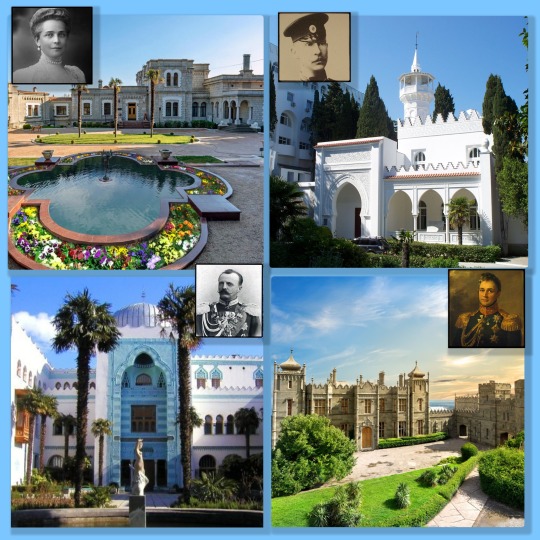
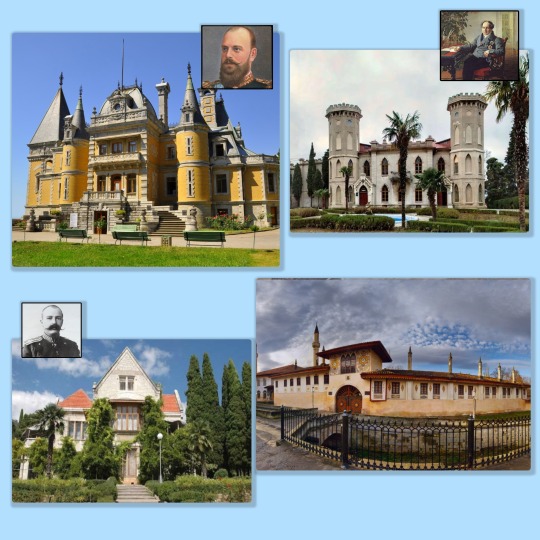
The other palaces in the Crimea
The Palace of Koreiz was owned by the Yousupov Family, and the inside photos show an exquisite place. It is worth taking the time to check them out.
The Palace of Kichkine was built by Grand Duke Dmitry Konstantinovich as a place he could enjoy with his nephews.
Dulber means "beautiful" or "heart stealing" in Tartar. This palace was built by Grand Duke Pyotr Nikolaievich. Design and construction were based on his sketches. The Grand Duke had great knowledge of Middle Eastern Architecture and history. The palace has more than 100 rooms.
The Vorontzov Palace (built by Prince Mikhail Vorontzov) is one of the oldest palaces in the Crimea. It has 150 rooms and is surrounded by gardens and parks. Vorontsov's palace started a tradition of imperial residency in the area. Many Russian elite were attracted to build villas and palaces in the Crimea.
Massandra: This palace was initially being built for the Vorontzovs, but a death in the family caused the project to halt. Alexander III bought the palace and had it redesigned. The family never stayed in the palace, preferring their other palace at Livadia (the old Livadia palace, not the beautiful white heaven we all know and love.
The Golytzin Palace: This palace can only be seen on the outside. It has a long and turbulent story. The Golytzin who built it only lived in it for one year.
Harax: Grand Duke George Mikhailovich's wife, Grand Duchess Marie Georgievna, wanted an English country house in the middle of the Middle East. Everybody thought it could not be done but it was. George and Marie spent the best years of their very troubled marriage living at Harax.
Bagçesaray Palace of the Crimean Khans is a compact architectural ensemble consisting of 17 buildings and 9 inner closed courtyards. I have included a photo here because it is a source of much controversy. The palace is said to be magically beautiful and, in 2013, was listed by UNESCO as a potential addition to its World Heritage List. It was the administrative capital of the Crimean Khanate from 1532 to 1783. Apparently, the renovations have been botched. The issues regarding this historic treasure will have to be picked up again once the region has restored peace. Right now, they are not the priority.
The nobility in the Crimea
By the end of the Russian Empire, Crimea had become the most coveted "vacation spot" for the Russian elites. Palaces continued to sprout up. The sun, sea, mountains, flowers...and nobility had each other. Summers in Crimea became almost like an informal season, with teas, picnics, the occasional balls, dinners, etc. And protocol was eased. The Tsar was a frequent visitor to Harax and Dulber (at one point.) He enjoyed sitting outside and smoking. When he was there, the cossacks were there for musical entertainment.
.
#russian history#imperial russia#romanov family#Princess Zenaida Yusupova#Koreiz#Harax#Dulber#Golytzin Pa;ace#Vorontsov Palace#Dulber Palace#Kichkine#Bagçesaray Palace#Massandra Palace
20 notes
·
View notes
Text

Princess Zenaida Youssoupoff at Koreiz
#princess zenaida youssoupoff#Princess Zinaida Yusupova#Koreiz#Yusupov#yussupov#youssoupoff#Youssoupov
13 notes
·
View notes
Text
Felix Yusupov on his imprisonment in Crimea under the German army, and the news of the murder of the Romanovs

We awoke to be told that the Germans had arrived. This was a solution of our difficulties that no one had foreseen.
It was then April and a few days before Easter. On March 8, the Soviet government had signed the peace of Brest-Litovsk, and the Germans had begun occupying certain parts of Russia. They liked to pose as liberators to an over-credulous population who were exhausted by trials and privations and only too happy to welcome them as such. It was, in fact, their arrival that saved the lives of the prisoners of Dulber. The general rejoicings over their sudden and unexpected release can well be imagined. The German officer wanted to hang Zadorozhny and his men. He was thunderstruck when the Grand Dukes begged him not to dream of such a thing. On the contrary, they asked him to leave Ai-Todor under the protection of their late jailers. The German finally consented, on condition that he was relieved of all responsibility should anything go wrong. It was quite clear that he was convinced that their prolonged detention had driven the poor Grand Dukes mad. A few days later, after touching farewells, the jailers and their prisoners parted. The younger ones cried and kissed the hands of their former captives!
In May, one of the Kaiser's aides-de-camp arrived in Yalta. He brought with him an offer from his Imperial master to proclaim Tsar of all the Russias any member of the Imperial family who would consent to countersign the Treaty of Brest-Litovsk. All the Romanovs present rejected the proposal with indignation. The Kaiser's envoy then asked my father-in-law to arrange a meeting with me. The Grand Duke refused, saying that no member of his family would ever turn traitor. After their release, the prisoners remained for some time at Dulber; then the Empress went to live at Harax, an estate belonging to the Grand Duke Georgy, one of my father-in-law's brothers, and the rest returned to their homes.
As time went by, things became more or less normal. The relief felt by the older generation was tinged with a certain uneasiness, but the young people gave themselves up to the joy and excitement of being alive and free. Life became a round of pleasures: picnics, tennis parties, outings of all kinds. We found a new distraction in the founding of a weekly magazine. A friend of ours, Olga Vasiliev, a charming and intelligent girl, was editor. We used to meet at Koreiz every Sunday evening. After the latest news, Olga would read aloud the articles that each of her sixteen correspondents had written during the week on a subject left to their own choice. This was usually either some fabulous adventure, or an imaginary journey to some distant land, which was rather touching when one thinks how uncertain was the future of the youthful authors. The meetings began and ended with a hymn to the glory of the newspaper, which we sang in chorus. As the electric current was cut off at midnight, these evenings generally ended in candlelight. The interest which our parents took in our magazine and the amusement they derived from it did not prevent their feeling a trifle uneasy, for they knew that, in such troubled times, the most innocent pastimes were dangerous. Our periodical had a short life. It appeared only thirteen times; then all the members of the staff, one after the other, were laid low with Spanish flu. When, later on, we were obliged to fly for our lives and had to reduce our luggage to a minimum, the first thing that my wife packed was the gazette.
The Grand Duke Alexander had given his daughter a grove of pine trees, perched on a cliff above the sea, an enchanting spot. In 1915, we had built a little country house there; it was whitewashed inside and out, and had a green-tiled roof. As it was on a slope it was all lopsided, and its greatest charm lay in its complete lack of symmetry. A carpet of flowers stretched before the front door. A few steps led down from the entrance to a gallery overlooking the hall, which gave onto a terrace with a fountain in the center. Through another door one reached the swimming pool, which was surrounded by a pergola smothered in roses and wisteria, as was the house. As the cottage was all on different levels, it lent itself to a profusion of funny little staircases, unexpected corners, landings and balconies. The furniture was of oak with chintz cushions, and was somewhat like old English country furniture; there were rush mats on the floor instead of carpets. We were, alas, never able to live in the place, but during the comparatively happy days of the summer of 1918 we sometimes had picnics there. Food was scarce and the guests had to bring their own, but there was plenty of wine as everyone in the Crimea owned vineyards. There was also no lack of gaiety, for the young are ever ready to forget the trials of the day and look forward with eagerness to the future, however threatening it may be.
It was the day before one of these picnics that we heard that the Tsar and his family had been assassinated. But there were so many wild rumors afloat at the time that nobody believed them any longer, and the party was not even canceled. The news was denied a few days later, and a letter was published purporting to have been written by the officer who had saved their lives. Soon, alas, it was no longer possible to doubt the terrible truth. But even then the [Dowager] Empress Maria refused to believe it, and to her dying day treasured the hope of seeing her son again.
source: Lost Splendour by Felix Yusupov, chapter 26
5 notes
·
View notes
Text
Even with the war ongoing and the front line just 65 kilometers (40 miles) from the northern Crimean city of Armyansk, Russian tourists continue to travel to the occupied peninsula for recreation. Since the start of July, heavy traffic around the Kerch Bridge has been a regular occurrence. (Russia’s Federal Road Agency says the traffic is due to vehicle inspections, which have become more frequent since the travel season began.) The independent journalists’ cooperative Bereg asked Russians to explain why they’ve continued spending vacations in Crimea. With Bereg’s permission, Meduza is sharing excerpts from their interviews in English.
Alyona
28 years old, Orenburg
We went to Crimea in August 2022; we vacationed in Feodosia. When my husband and I reserved our hotel rooms, paid for them, and planned our itinerary, the conflict [between Russia and Ukraine] hadn’t started yet. When it all started, we paid close attention to the news and thought hard about what to do. But we ultimately took a chance and decided to go.
The atmosphere was tense. They were transporting new and damaged equipment [to the peninsula] for repairs, there were fighter jets flying overhead, and our Black Sea Fleet was in the harbor. There were also a lot of refugees getting their families out of [Ukraine], driving cars that were packed to the brim with belongings. But at the same time, everything felt calm.
In July 2023, my husband, my sister, and I went to Feodosia again. We weren’t scared. The Crimean peninsula is very well protected: there are a lot of our soldiers patrolling the streets, and we felt safe. We weren’t even thinking about danger.
The locals are happy to see Russian tourists. Some people told us that they’re very glad to have become part of Russia, although we didn’t ask them about it too much. But people told me several stories about how the Crimeans were terrorized when the peninsula joined Russia [and afterwards]. I think it’s obvious who did this: there was the “dirty bomb” that they wanted to drop on them, and they shut off the water and power. [Before the annexation], there were a lot of problems in the cities; nothing was getting fixed. [Both then and now], people said that they grew up in the USSR and that they’ll remain with Russia.
[...]
We travel to Crimea because we believe our resorts are every bit as good as international ones, and we want our money to stay in the country and to go towards developing Russian tourism. Crimea is my special love.
Anna
44 years old, Arkhangelsk region
We vacationed from July 4–11 in Koreiz. My husband absolutely loves the peninsula, and this was our first vacation together in four years, so we decided to go to his favorite place. It wasn’t scary since we’d already been there twice.
Things are calm there, and there’s practically nothing to remind you of the war, except for the thorough inspection on the bridge. The only thing we discussed with the locals was the traffic and the fact that there are fewer people this year.
It was a wonderful vacation. We’ll definitely go back.
Anonymous
32 years old, St. Petersburg
We’re currently (Editor’s note: this interview was conducted on July 12) on vacation in Feodosia. We came here for a week; we’re heading home in a few days. We come here every year and stay with relatives. The journey here was scary, of course, but our relatives told us that things are calm right now. There are other people here on vacation, but not too many. We came from Anapa, where we also vacationed for about a week, but there are a lot more tourists there.
[...]
Every year, the city [of Feodosia] gets nicer: they put up more statues, beautiful new streets, and recreational areas; they restore historic sites and build new roads. In the evenings, people go out to the embankment, which is surrounded by cafes and restaurants, and they’re far from empty.
Things truly are calm here right now. It used to be more stressful: our relatives said they saw drones flying over the sea. In the summer of 2022, there were even fighter jets, but not anymore.
Anonymous
16 years old, Lipetsk region
From July 4–11, I went on vacation with my parents in the town of Kacha near Sevastopol. We weren’t scared to travel there, because we knew there isn’t any fighting in the area. Anything’s possible, of course, but we were certain that everything would be fine. And we were right.
We chose Crimea for several reasons: first of all, we hadn’t been there in a long time, and we wanted to see it [again]. Second of all, a lot of people are, understandably, scared to go there, so other, safer resort destinations are crowded right now, whereas Crimea is half-empty. There really were very few people there!
We regularly encountered military vehicles, but apart from that, there was nothing unusual; the locals didn’t mention anything negative at all.
Overall, it was a good, unconventional vacation. I’ll remember it for a long time.
Angelina
39 years old, St. Petersburg
On June 28, my husband, our two kids, and I arrived in Yevpatoria, or, [more precisely,] in the village of Uyutne. My husband recently left, but I’m staying until August 7. We didn’t have any misgivings [about coming here], and I wasn’t nervous. I’m not afraid [of airstrikes]. I simply believe that everyone will do their jobs and the military will deal with whatever comes. I actually prefer these kinds of situations, because it means there are fewer people around.
I love this peninsula. We go on vacation every year, and we don’t always make it to Crimea, but we have been here before. Right now, it’s our most accessible option.
Anna
51 years old, St. Petersburg
We’ve come to Crimea every year since 2017. We usually spend two or three months in a different city each time: Feodosia, Utes, Yalta, Balaklava, Yevpatoria. Every year, it gets better and better here; the embankment gets nicer, they build more hotels, the service gets better. When you come once a year, you really notice the improvements.
I like Crimea because it has a variety of beautiful nature; natural fruits, berries, and vegetables; and more freedom than in the Krasnodar region.
Who said it’s dangerous here? The Ukrainians? The peninsula is a resort, so the atmosphere is that of a resort right now.
The Crimeans are very calm; they’re confident that everything’s fine and that there’s nothing to be afraid of. They know they’re under Russia’s protection. They’re just living their lives like normal.
Anonymous
25 years old, Moscow
I went to Crimea from May 1–11 and I stayed on the southern coast. I was a little scared, but I know a lot of people on the peninsula, so I consulted them about the situation in advance and decided it would be fine to go. I also had friends who went on vacation to Crimea earlier, in March and April. They also told me everything would be fine.
[I chose Crimea] for personal reasons. The locals are discussing the same things as people on the mainland (and they all have concerns about the future), but nobody said much about the situation in Crimea. Things were calm overall, but the military ships and the people in uniform in the trains, the train stations, and the city made it difficult to forget the current military and political situation. It was impossible to ignore and was a little depressing. There were also fewer vacationers than in peacetime.
Lyudmila
St. Petersburg
We just returned from Feodosia. My husband is a soldier, and we went to a military resort. [Because of his work], we’ve gotten used to unexpected changes. We tried not to watch the news in the lead up to our trip, to avoid overthinking things.
We usually submit requests to visit the military resorts in November, and they give us vouchers to go to different places. This time, they gave us one for Crimea. We weren’t scared to vacation there, since we were guarded by soldiers with machine guns, who were constantly on patrol. There were barricades with anti-tank barriers at the checkpoint, just like you see in war movies. At the resort we went to, there were also injured [soldiers] from the special military operation who were undergoing rehab. It was a sad sight, of course — they were young and maimed. I have two sons myself, so I looked at those men with tears in my eyes.
#I just can't handle the either intentional or unconscious disconnect here#it's sickeningly fascinating
3 notes
·
View notes
Text

Vasnetsov Apollinary (1856-1933)
CRIMEA. PUENTE EN KOREIZ
1924
Tamaño - 41x33
Material - lienzo sobre cartón
Técnica - óleo
Número de inventario - MKV Zh-166
Recibido de acuerdo con la voluntad de E.K. Vasnetsova. 1998
Información e imagen de la web de la Arte y colecciones de Bertel Thorvaldsen.
4 notes
·
View notes
Text






“Alessandria romantica” - il palazzo della contessa Paninoi tra Koreiz e Gaspra.
🧱 Il palazzo fu costruito dal 1831 al 1836 per il conte Alexander Golitsyn . In onore del proprietario, la tenuta fu chiamata Alessandria . Dopo la sua morte nel 1865, il palazzo fu acquistato dal nobile Levashev, la cui moglie era la contessa Sofya Panina .
🏙 Dopo la rivoluzione, il palazzo Panina divenne un luogo di cura di tutta l'Unione e dagli anni '50 la pensione Yasnaya Polyana.
0 notes
Photo

Кореиз #art #drawing #illustration #graphic #graphicart #cityscape #town #street #scenery #pastel #sea #oldcity #oldtown #architecture #artwork #artistsoninstagram #crimea #koreiz #крым #кореиз (at Koreiz) https://www.instagram.com/p/B0lrSvLojfY/?igshid=175641eusgmic
#art#drawing#illustration#graphic#graphicart#cityscape#town#street#scenery#pastel#sea#oldcity#oldtown#architecture#artwork#artistsoninstagram#crimea#koreiz#крым#кореиз
2 notes
·
View notes
Video
youtube
🍎 МИСХОР ПЛЯЖ РУСАЛКА НАБЕРЕЖНАЯ🍎СНОРКЛИНГ СТАИ КЕФАЛИ И КАРАСИ, ЁРШ (СК...
#Yalta#Ялта#Крым#Мисхор#Кореиз#отдых Мисхор#отдых Крым#отдых Ялта#экскурсии#подвох#Crimea#snorkeling#beach#Miskhor#Koreiz#mullet#scuba diving#Black Sea#Ali Baba#Мисхор причал#пляж Мисхор#дайвинг#прозрак#зубарик#караси#морской карась#ласкирь#рыбы#черноморская рыба#рыбалка
0 notes
Text

Theatrical troupe named "Le Vessiolyi Arnolf ", theatrical performance by residents of the Imperial Family and friends at Ai-Todor and Koreiz (Crimea) in 1918:
Back Row Left to Right:
Prince Feodor Alexandrovich Romanov
Prince Nikita Alexandrovich Romanov
Prince Roman Petrovich Romanov
Baron Alexander Nikolaevich Fersen
Vera Alexandrovna Somova
Prince Felix Felixovich Yusupov
Front Row Left to Right:
Princess Irina Alexandrovna Romanova-Yusupova
Prince Andre Alexandrovich Romanov
Baroness Maria Alexeievna Stael von Holstein
Baron Pavel Nikolaevich Fersen
Duchess Elena Georgievna of Leuchtenberg,Princess
Romanovskaya
? Pavlov
Princess Marina Petrovna Romanova
Olga Konstantinovna Tchirikova
Count Stephan Eugenius Maria Tyszkiewicz
12 notes
·
View notes
Text
"In St. Petersburg we work, but at Livadia, we live."
Grand Duchess Olga Alexandrovna
In 1909, Nikolay Krasnov, who was responsible for the Yousupoff Palace in Koreiz, was engaged to design a new imperial palace in Livadia (before that, there had been an imperial residence in Livadia consisting of a large and a small palace used by Alexander II and later by Alexander III, who died at the smaller residence.) When Nicholas II decided to build the new palace, he also demolished the older residence but left the small palace where his father died.
The Tsar's diary indicates that the Imperial Family discussed the design; it was decided that all four façades of the palace should look different. After 17 months of construction, the new palace was inaugurated on 11 September 1911. In November, Grand Duchess Olga Nikolaevna celebrated her 16th birthday at Livadia.
The family was always the happiest at Livadia.
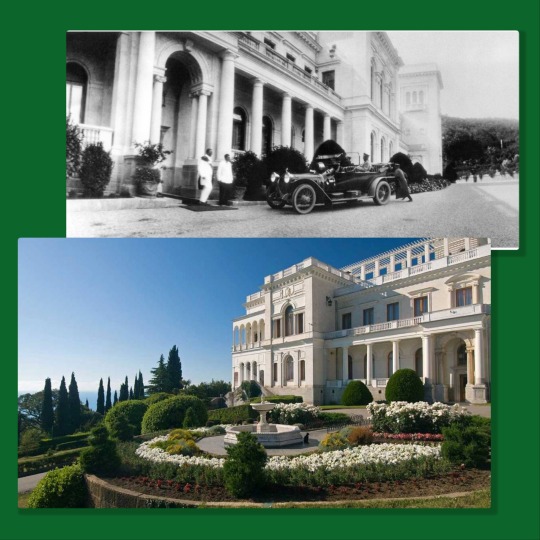
One of the Tsar's "motors" at Livadia. If you look carefully, you can see the "side of the palace" where the car is parked and the main entrance in both the contemporary colored and black and white photos.
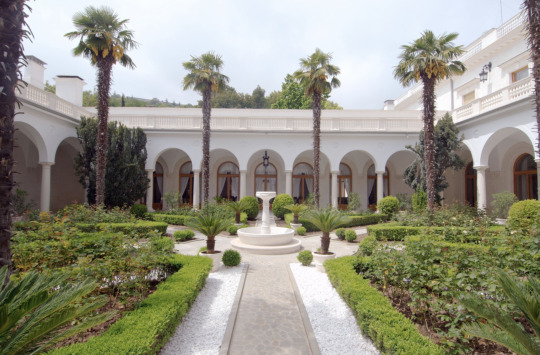
Above is the beautiful Italian Courtyard of the palace as it stands today. If you look at pictures taken when the Romanovs used the palace, the centerpiece of the courtyard was different. Today, there is a fountain at the center. Examining the older pictures (below), you can see that there seemed to be what I can only describe as a "well" at the center of the courtyard. There was a column on each side of the well. In one of the photos below, you can see Grand Duke Dmitry Pavlovich; he had his own rooms at the Livadia Palace.
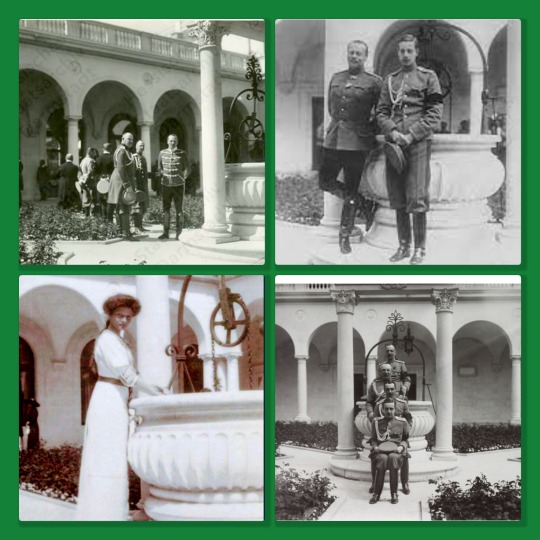
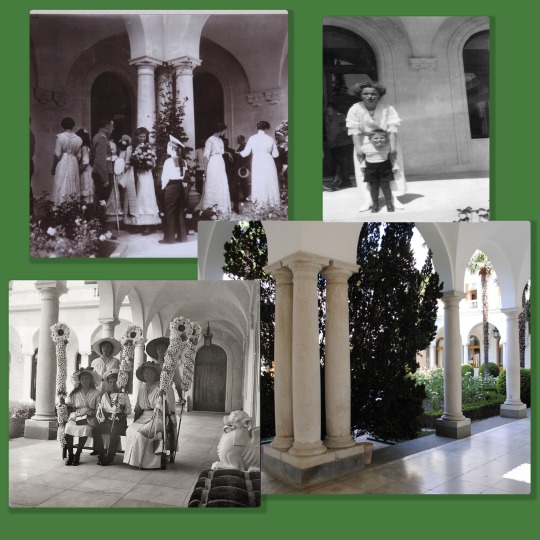
Nicholas II and his family were so at ease at Livadia that they also conducted some minor official functions in addition to family activities. When the family went to Livadia, they usually went as far as Yalta by sea; it is easy to infer that the official activities they conducted were related to the crew of the Standart. In addition, at the time, it was believed that mountain air and rest could cure tuberculosis, and there were several spas and sanatoria in the mountains in the area. The Empress and the girls visited the sick there (they also participated in other charitable activities.)
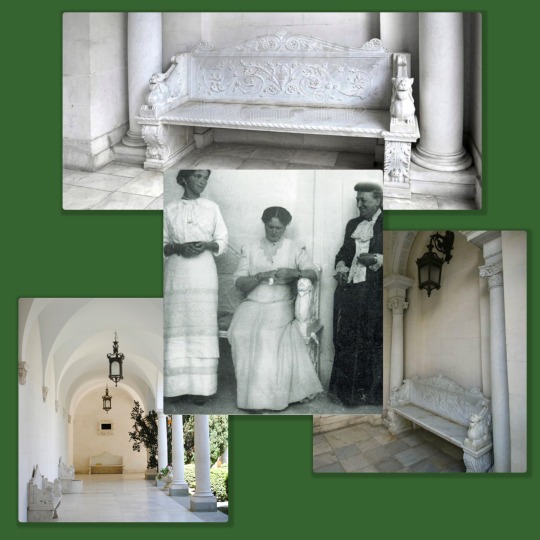


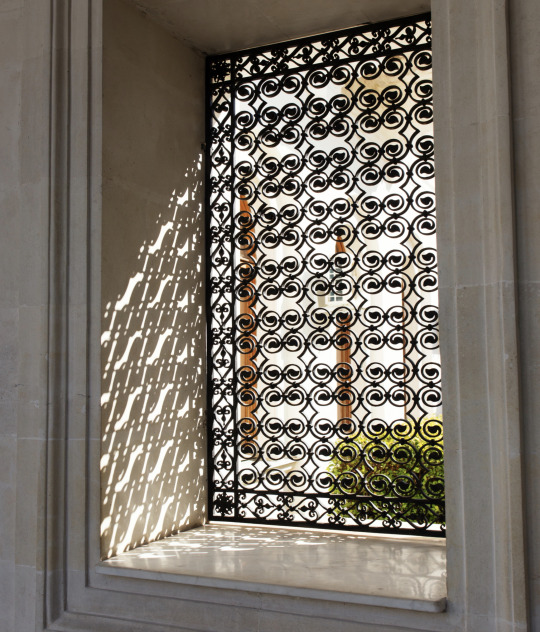
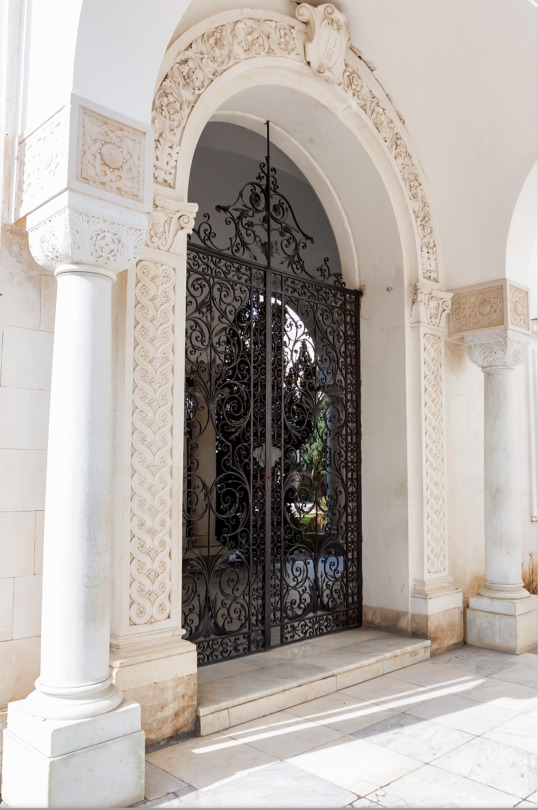
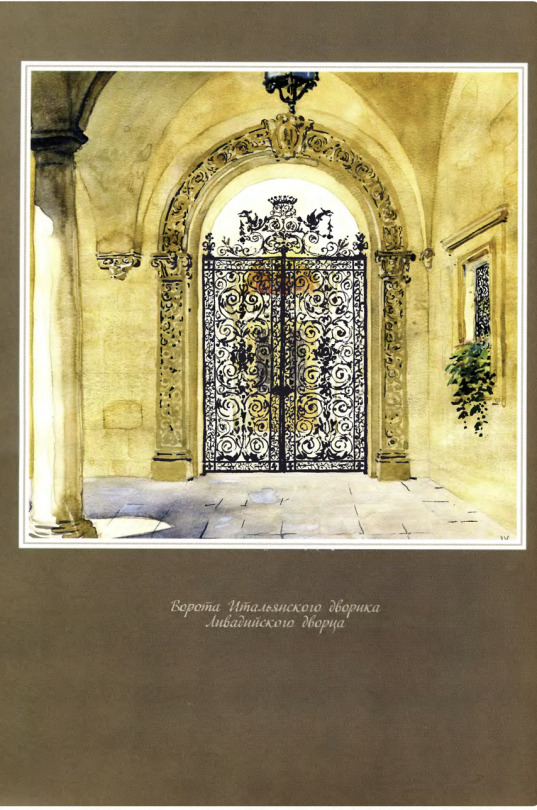
The Yousupov family gifted the beautiful door above to Nicholas and Alexandra. The painting next to it is from a beautiful book by Kravnov ("Fiftieth Anniversary of Yalta"), who worked on the palace's design (and on that of the Crimean summer residences of several Grand Dukes.) The window is also featured in the painting.
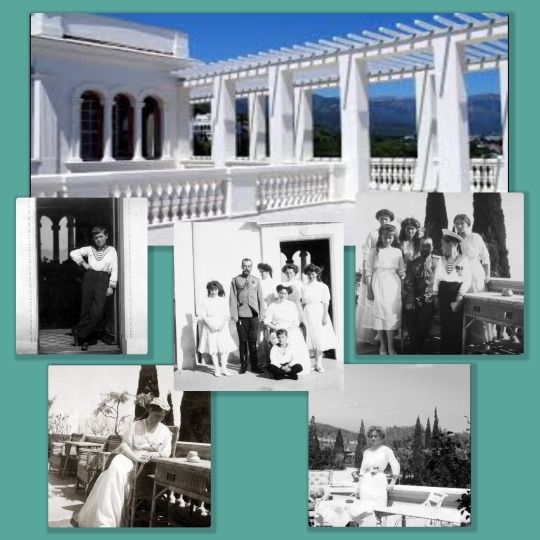
The "solarium" seems to have been a very popular area. Nicholas and his children preferred the outdoors, and Livadia seemed to provide the Empress with the perfect environment to get sun and fresh air in comfort regardless of her many ailments.
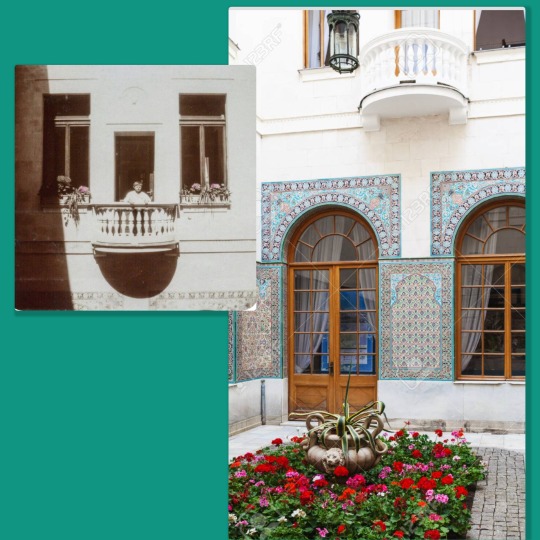
This is the "Moorish" courtyard of the palace. It is small, but notice the exquisite tilework on the walls. And, of course, the little balcony between the windows seemed perfect to Alexis for him to "address" his family.
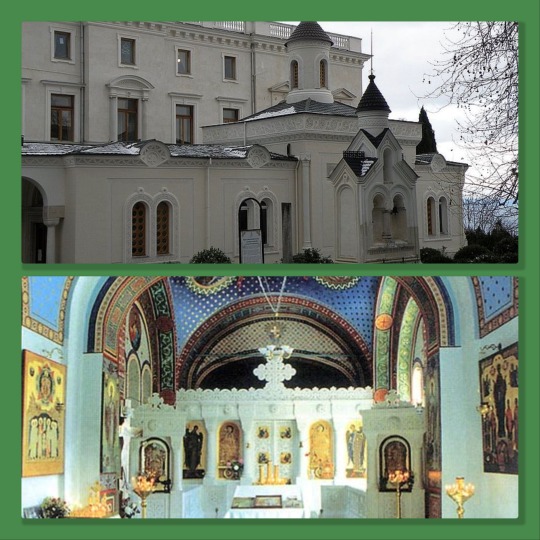
The palace had a chapel so that the Romanov family could worship in privacy.
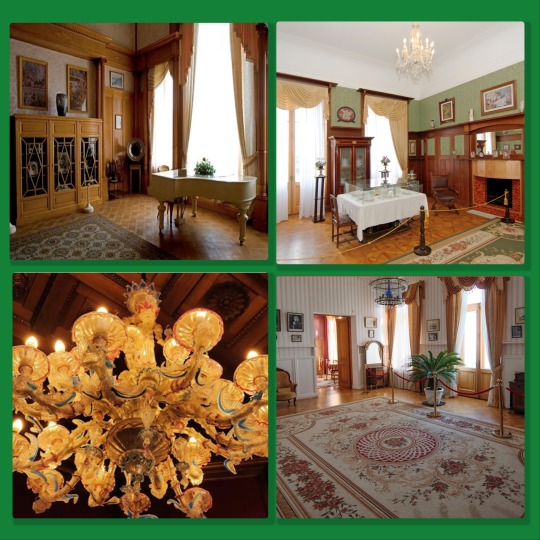
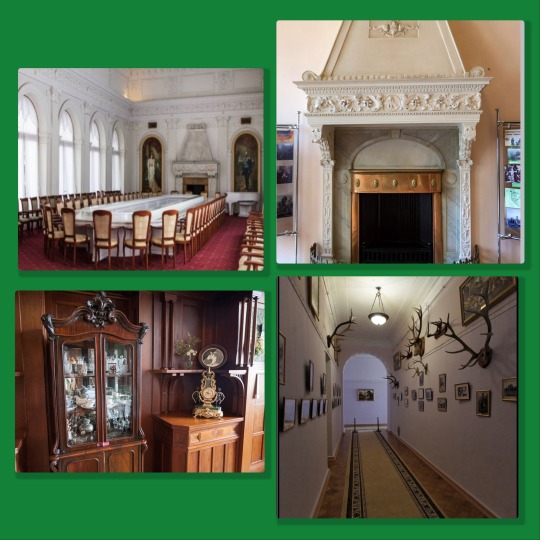
A few of the interiors of the palace. The chandelier is Murano Glass (amazing that it survived all these years.) Olga's coming-of-age celebration took place in Livadia in the formal dining room in the photograph above, dancing spilling into the flower-perfumed courtyard. That is a luxury of the type you cannot buy! The girls' rooms are currently being restored. There are pictures of the rooms as they were, but I was not sure they were from Livadia, so I did not include them.
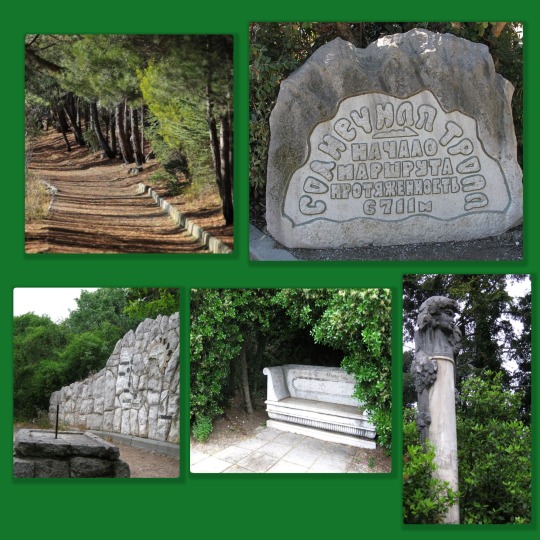
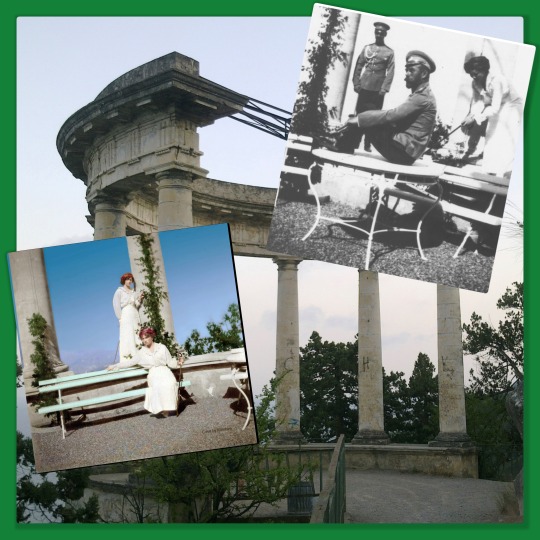
Finally, some photos of the "Tsar's Path" (or Sunny Path), which exists to this day (it goes from Livadia Park to the city of Gaspra.) The family loved to walk this path (regardless of its name, it is not sunny but pleasantly breezy). This path is on one level so that anybody can walk it, regardless of their cardiovascular status. I have read two stories about how it "emerged," and as usual, the truth is probably in the middle. First story: The new Livadia Palace did not exist yet, but the Romanovs used the old palace and always loved coming to Livadia. Alexander III kept gaining weight, and his doctor recommended that he walk but not overdo it...so Alexander had the path leveled. The path's beginning and end differed from what they would be later. Second Story: Sandro had the path from Ay Todor toward Livadia built because Nicholas and Sandro's families always visited each other (they started calling it the Prince's Path.) Nicholas loved the idea and extended the path.
Today, the main path remains, and other routes to other small towns can be hiked from it. Many of the same benches and sculptures are where they were at the time of the Romanovs.
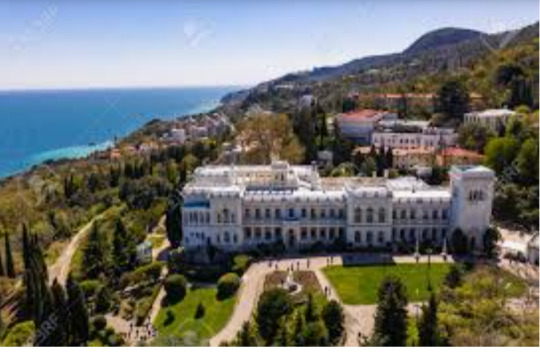
Just one last photo. Here, you can see how close the palace is to the mountains and the sea. A beautiful big house full of fresh air and light with flowers perfuming the air. No wonder Olga liked it so much! (gcl)
#russian history#romanov dynasty#nicholas ii#otma#Empress Alexandra Feodorovna#Emperor Alexander III#Grand Duke Alexander Mikhailovich#Ay Todor#Nikolay Krasnov#grand duchess olga nicholayevna#Grand Duchess Tatiana Nicholayevna#Grand Duchess Maria Nicholayevna#Grand Duchess Anastasia Nicholayevna#Tsarevich Alexei
61 notes
·
View notes
Text


Princess Zenaida Youssoupoff at Koreiz, November 1897.
#Princess Zenaida Youssoupoff#Princess Zinaida Yusupova#Yusupov#Yussupov#Youssoupoff#Youssoupov#Russian Nobility
18 notes
·
View notes
Text
Felix Yusupov on his imprisonment in Crimea following the October Revolution

Judging by the big Delaunay-Belleville car which met me at the station, flying a pennant with an enormous crown on it and our coat of arms on the doors, life in the Crimea was still comparatively normal. A few months previously, after a long struggle to maintain discipline, Admiral Kolchak, who was then commander-in-chief in the Black Sea, broke the Golden Sword he had been awarded for outstanding valor, threw the pieces into the sea and resigned his command. Then one day soon after my arrival, the Black Sea Fleet went over to the Bolsheviks. There followed a terrible massacre of naval officers in Sebastopol. Bands of sailors broke into houses, looting and murdering, raping women and children in front of their husbands and parents; torturing men to discover their valuables. I happened to see some of these sailors, pearl and diamond necklaces banging on their hairy chests, their arms and fingers loaded with bracelets and rings. Among them were youngsters of fifteen. Many were grotesquely powdered and made up. It was like a masquerade in hell. In Yalta, mutineers tied stones to the feet of their officers before shooting them, and then tossed their bodies into the sea. Later, a diver sent down to explore the bottom of the bay went out of his mind at the sight of these corpses standing upright in ghostly array and swaying in the current. We were never sure, on going to bed at night, of waking up alive in the morning. One afternoon a band of sailors came to Yalta to arrest my father. I told them that he was ill, and asked to be shown their warrant. Of course they did not have one, and I played for time by telling them to go and fetch one. After endless discussions, two of them reluctantly consented. As they had not returned several hours later, their companions grew tired of waiting, and left.
A few days later, another band of sailors came down from the hills behind Koreiz. They called themselves "naval cavalry." They were well-known for their cruelty and were dreaded even by the Soviets. Armed to the teeth and mounted on stolen horses, they rode into our courtyard brandishing flags with the most promising slogans such as "Death to the bourgeois! Death to the anti-revolutionaries! Death to the landlords!" A terrified servant came to tell me that they were demanding food and wine. I went into the courtyard. Two of the sailors dismounted and came to meet me. They had degenerate and brutal faces; one wore a diamond bracelet, the other a brooch. Their uniforms were stained with blood. They said they wanted to speak to me in private, so I took them to my room after sending the rest of the band to the kitchen for refreshments. Irina's face was a study when she saw me come in with my two ruffians! I sent for some wine and we all four settled down to a cosy talk. Our visitors did not seem at all embarrassed, but stared at us with curiosity. Suddenly one of them asked me if I was really the man who had murdered Rasputin, and on receiving my reply they both drank to my health, declaring that that being the case neither my family nor I had anything to fear from them. They began recounting their heroic feats against the White Army. Then, catching sight of my guitar, they asked me to sing. I did so, feeling rather relieved to put a stop to their unsavory reminiscences. I sang several songs and they joined in the choruses; one bottle after another was emptied and our guests got more and more boisterous. My parents, whose room was above mine, wondered what all the noise was about. But all things come to an end, and the sailors finally went off after shaking hands with us again and again, and thanking us effusively for our hospitality. The whole band jumped into their saddles, waved farewell in the most friendly fashion, and brandishing their flags disappeared into the hills.
Kerensky's commissar at Ai-Todor had been dismissed and a new man appointed by the Soviets. My father-in-law [Grand Duke Alexander], in his book, describes this arrival as follows: We are feeling the effects of the new Revolution. Djordjuliani, our head jailer, has been replaced by a sailor called Zadorozhny. I was introduced to him on his arrival, in the room occupied by our guards. He is an enormous, savage-looking brute, yet there is a certain kindliness about him withal. Most fortunately our first conversation was in private, and from the beginning he was extremely polite. I asked him where he had served. In the Air Force, he replied, adding that he had seen me several times at Sebastopol. We then talked about the general situation, and from what he said I gathered that he was on our side, although he frankly admitted that he had at first allowed himself to be drawn into the revolutionary movement... We parted the best of friends. It is a great comfort to know that we can depend on him. He treats us roughly before his comrades to disguise his real feelings. Meanwhile a man by the name of Spiro appeared at Ai-Todor and assembled all its inmates for a roll call. The Dowager Empress refused to come down, merely showing herself for an instant at the top of the stairs. Zadorozhny first came to Ai-Todor in December; in February he told my father-in-law that all the Romanovs residing in the Crimea were to be interned along with their suites at Dulber, an estate belonging to the Grand Duke Pyotr Nikolaievich. He explained that this was being done to ensure their safety. It appeared that the Yalta Soviet was insisting on their immediate execution, whereas the Sebastopol Soviet - from which Zadorozhny took his orders - wanted to await Comrade Lenin's instructions, and feared that the Yalta Soviet might attempt to seize the prisoners by force. The reason why Dulber had been chosen was that it would eventually prove easier to defend than Ai-Todor, as it had high thick walls and was more like a fortress than a palace. Among those who were interned were: the Dowager Empress, my parents-in-law and their six sons; the Grand Duke Nikolai Nikolaievich, his wife and her two children from a first marriage; the Grand Duke Pyotr and the Grand Duchess Militza and their children, Princess Marina and Prince Roman. As for their youngest daughter, Princess Nadezhda who was married to Prince Orlov, the Grand Duchess Olga Alexandrovna, and my wife, who were all married morganatically, they were allowed to go free.
At Dulber, the prisoners were completely cut off from the rest of the world. The only person allowed to visit them was our daughter Irina, then two years old. Through her, we managed to communicate with them. Her nurse took her to the gates of the park and the child entered it alone, with our letters pinned inside her coat. The answers reached us in the same way. Our little messenger never let us down. The conditions in Dulber were none too good; things were very uncomfortable and food was very scarce. Kornilov, the chef, who later kept a famous restaurant in Paris, did the best he could with the little he had: mostly buckwheat and pea soup. Once, for a treat, the prisoners of Dulber had donkey for lunch and billy goat for dinner. Knowing that her brothers were allowed out in the park, my wife invented a system by which we could communicate with them. We used to go for a walk with our dogs under the walls of the estate. Irina would call the dogs and instantly one of her brothers would appear on top of the wall. If he caught sight of a jailer, he would slip to the ground and we walked on looking as innocent as we could. Unfortunately our stratagem was found out before long.
I met Zadorozhny one afternoon and we walked a little way together. After asking for news of his prisoners, I told him that there was something I wanted to speak to him about; he seemed surprised and a little embarrassed. Presumably he did not want his men to see him with me. So I asked him to come one evening to my house, where he could be sure of not meeting anyone he knew. To get into the house unobserved, all he had to do was to climb over the balcony of my room, which was on the ground floor. He came that evening and several times afterward. My wife was often present at our meetings. We spent hours trying to find some way of saving the Empress Maria and her family. It became more and more evident that this fearsome-looking giant was sincerely devoted to us. He explained that he was fighting for time by exploiting the rivalry that existed between the two Soviets: that of Yalta which wanted to shoot the royal prisoners on the spot, and that of Sebastopol which, in agreement with Moscow, wanted them to be tried. I suggested his telling the Yalta Soviet that the Romanovs were shortly going to be transferred to Moscow for trial, and that if they were shot out of hand important state secrets, known only to them, would be lost. Zadorozhny took my advice. He had managed to protect his prisoners until then, but the situation grew daily more difficult, as the Yalta Soviet suspected that he was trying to save them, and his own life was in danger. A few days later he came to our house in the middle of the night to tell me that he had received information from a reliable source that a large party of sailors was coming the next day to take the prisoners to Yalta and shoot them. He had decided to be away when they arrived, as he was sure of his men and knew that in his absence they would not allow anyone to enter the estate. He added that the young princes had already, for several nights, taken turns at mounting guard, and that arms were held in readiness for them in case of alarm, He also announced that there was going to be a general massacre in which no one would escape... The news was all the more unpleasant as we were incapable of defending ourselves, for all our arms had been confiscated.
Sure enough, the troop of sailors arrived next day from Yalta and tried to enter Dulber. As Zadorozhny had foreseen, his men said that in the absence of the commissar, their orders were to admit no one. The walls were bristling with machine guns, and when they saw that the guards were prepared to use them the aggressors left, shouting insults and threats as they went. We knew that after this unsuccessful venture, Yalta would take steps to end the matter once and for all. Foreseeing that a massive attack was imminent, Zadorozhny went to Sebastopol himself to fetch reinforcements. He was expected back the same evening. But Yalta lay closer to Dulber than Sebastopol....
We spent the night on the roof of our house, from which we could see the towers of Dulber and keep an eye on the road by which both the reinforcements from Sebastopol and the bandits from Yalta would arrive. It was dawn when we saw the armored trucks from Sebastopol drive past. As nothing appeared from Yalta, we went to bed. We awoke to be told that the Germans had arrived. This was a solution of our difficulties that no one had foreseen.
source: Lost Splendour by Felix Yusupov, chapter 26
3 notes
·
View notes
Text

▪️Ai-Petri, is a peak in the Crimean hills. For administrative purposes, it belongs to the municipality of Yalta, Crimea. It is one of the most windy places in Ukraine - the wind blows in the place for 125 days a year, reaching a speed of 50 m / s. The peak is located above the city of Alupka and the municipality of Koreiz.
5 notes
·
View notes
Photo
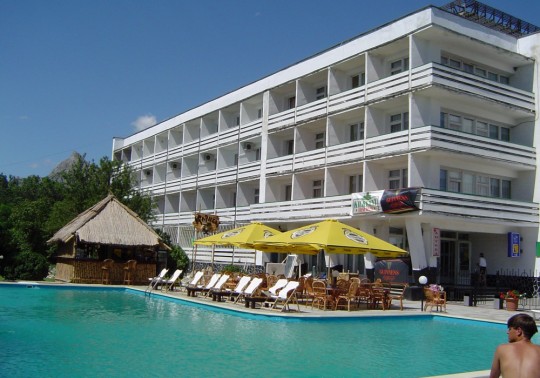
Россия, Кореиз 29400 р. на 7 дней с 05 октября 2020
Отель: Отель “1000 и одна ночь” (”1001 ночь”) подробнее https://naekvatore.ru/tours/rossiya-koreiz-0
0 notes
Video
youtube
🍎 ГАСПРА ЦАРСКАЯ ТРОПА ЗИМА, МИСХОРСКАЯ ГАВАНЬ 🍎ТАВРСКИЕ ДОЛЬМЕНЫ 500 ЛЕ...
#dolmens#Crimea#Taurus#mountains#sea#Koreiz#Miskhor#necropolis#excursions#Crimean landscapes#nature of Crimea#Крым#Гаспра#Кореиз#некрополь#таврский могильник#гаспринские дольмены#таврские ящтки#таврские дольмены#дольмены#скалы#горы#Алупка#айпетри#Солнечная тропа#царская тропа#Ай-Петри#крымские виды#крымский пейзаж#крымская природа
0 notes
